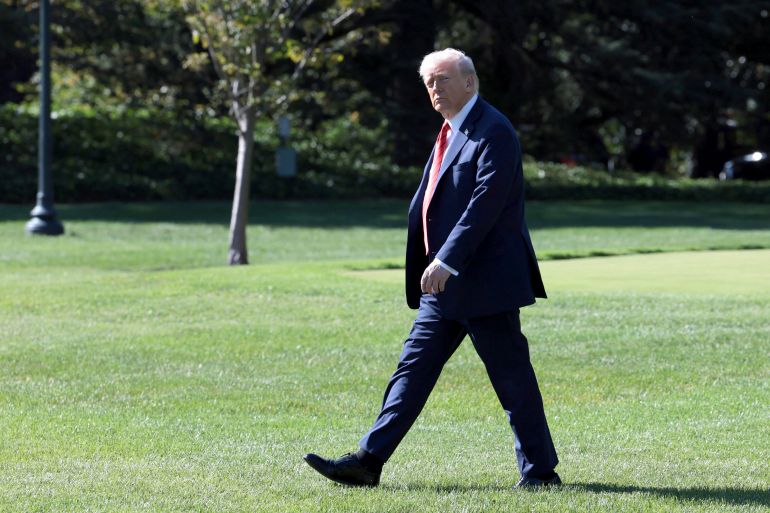Snubbed by Nobel, Trump to head to Middle East to celebrate Gaza ‘peace’
Donald Trump heading to Israel and Egypt on Sunday after Nobel Committee’s decision not to hand him Peace Prize after Gaza deal.

 Published On 10 Oct 202510 Oct 2025
Published On 10 Oct 202510 Oct 2025
Save
United States President Donald Trump is heading to the Middle East on Sunday as he looks to assert his perceived role as a peacemaker in the region after the Gaza ceasefire deal.
The visit would come days after the Nobel Peace Prize committee overlooked Trump’s public campaigning for the award and handed it to right-wing Venezuelan opposition leader Maria Corina Machado.
Recommended Stories
list of 3 itemsend of list
The White House has bemoaned the snub, accusing the Norwegian Nobel Committee of putting “place politics over peace”.
But in the Middle East, Trump is likely to be showered with praise from his hosts and credited with securing an end to the war in Gaza and the release of Israeli captives in the territory.
The White House said on Friday that Trump will depart for the Middle East on Sunday night, according to Al Jazeera correspondent Alan Fisher. The US president will first arrive in Israel, where he will make an address on Monday, before continuing on to Egypt for an official signing ceremony on the Gaza deal, Fisher reported from Washington DC.
Israel and Hamas have already lauded Trump’s role in the negotiations.
But analysts stress that for the deal to turn into long-term peace in Gaza, rather than another brief truce, the US president must pressure Israeli Prime Minister Benjamin Netanyahu against restarting the bombardment after the Israeli captives are released.
“I think that Donald Trump wants to oversee this very closely, and I think he wants to continue to send the message to Netanyahu that this is it. At least, that’s what I’m hoping,” said Mohamad Elmasry, a professor at the Doha Institute for Graduate Studies.
Advertisement
“I assume he’s going to go and say very nice things about Benjamin Netanyahu; that’s what he always does publicly. But let’s hope, let’s hope, that he’s going to apply pressure.”
While Trump is taking much of the credit for the deal, experts say other factors pushed the truce over the line, more than two years into the brutal Israeli assault that United Nations investigators have concluded is a genocide.
Yousef Munayyer, head of the Palestine/Israel programme at the Arab Center Washington DC, said after destroying more than 80 percent of the buildings in Gaza while failing to free the captives, Israel was getting “diminishing returns” from its campaign in the territory.
“Israel is facing growing isolation and costs for continuing down this road. And I think there are also Israeli domestic political factors that influenced the timing of this as well,” Munayyer told Al Jazeera.
Similar proposals to the Trump plan have been on the table for the past two years, but Netanyahu has insisted on continuing the war.
However, the latest ceasefire comes at a time when countries across the world, including some of Israel’s Western allies, are condemning its blockade on Gaza and belligerence across the region, including its attack on Qatar last month.
Despite the international outrage, Israel has continued to receive military and diplomatic support from the US.
Not only did the Trump administration fail to denounce Israel’s policy of imposed starvation in Gaza, it also backed the GHF aid scheme to militarise humanitarian assistance, which killed hundreds of aid seekers.
As Trump celebrates his version of peace in the Middle East, rights advocates say there can be no true stability in the region without ending the occupation and ensuring accountability for the genocide in Gaza.
Nancy Okail, head of the Center for International Policy (CIP) think tank, warned that normalising the horrific abuses in Gaza could lead to the collapse of international institutions.
“If there’s no accountability for what happened in Gaza, it’s a licence for others to do similar things, and that weakens and puts everyone in jeopardy,” she told Al Jazeera.
